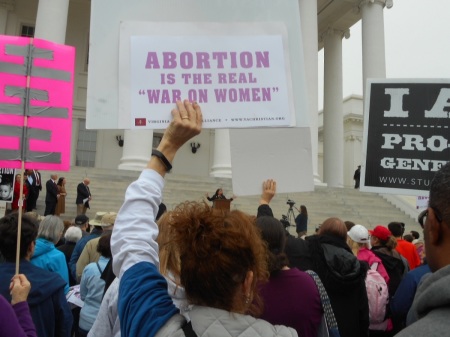Illinois' shocking abortion law is harmful to women

I’ve mentioned a few times that the possibility that Roe v. Wade might be in play, overturned, or at least rolled back, has prompted a significant uptick in state action on abortion. Some states are moving to limit abortion, hoping to be the source of the case that will be considered by the Supreme Court. Other states are racing to ensure that unrestricted abortion remains available within their borders.
In other words, the possible demise of Roe in no way signals the end of this decades-long struggle against abortion. The struggle has only shifted from the federal courts and Congress to the states.
Already this has led to radically extreme pro-abortion bills being passed in various states. Gone are protestations and hand-wringing that abortion is a “tragic necessity.” Instead, abortion is increasingly treated as a positive good. In fact, a few states seem to be in a competition for who can pass the most radical laws.
The leader in this grotesque competition at the moment: Illinois.
Earlier this month, the Illinois legislature approved the so-called “Reproductive Health Act” and sent it to the governor for his signature. I use the descriptive “so-called” because in it “reproductive health” means abortion. That’s it. Nothing else. Full stop.
There’s nothing in the bill about the state’s rising maternal mortality rate or the disparity in health and mortality disproportionately affecting African-American women, who are six times more likely to die in childbirth than their white counterparts. No, instead the Act is solely focused on making it beyond easy for Illinois women to get an abortion in that state. In fact, it’s not too much of a stretch to say that the only place Illinois can go from this “Reproductive Health Act” is to make abortion mandatory.
The Act opens by stating that “Every individual has a fundamental right to make autonomous decisions about the individual’s own reproductive health, including the fundamental right to use or refuse reproductive health care.”
The right to “refuse reproductive health care”? What does that even mean? Are women in Illinois forced to use contraceptives or go to the doctor? Of course not. This is only the first example of how this bill is filled to the brim with loose and dangerous language.
Two paragraphs later, the Act states it bluntly, “A fertilized egg, embryo, or fetus does not have independent rights under the laws of this State.” That means a man who kills a pregnant woman could only be charged with one homicide, not two. Or that a man who intentionally punches a pregnant woman in the stomach and causes a miscarriage would only be charged with assault on the woman. How the loss of the child would be described and handled isn’t clear. The only thing that’s clear is that this kind of devastating language has been used in past times to legally justify history’s greatest horrors.
And it gets worse. The Act arguably opens the door for non-physicians to perform abortions. Its definition of “health care professional” includes “advanced practice registered nurse, physician assistant, or person acting under the supervision of one of the above.”
It’s not clear who “a person acting under the supervision of one of the above” might be, but it brings to mind the punchline from those commercials “No, I’m not a doctor, but I did stay at a Holiday Inn Express.” So what does “acting under supervision” mean? Does the supervisor have to be in the same room? In the same building? The same county? The workers responsible for mis-administering anesthesia in Philadelphia were under the supervision of Kermit Gosnell, and we all know how tragically that worked out.
When this provision is combined with the Act’s explicit exemption of abortion from the state’s Ambulatory Surgical Treatment Center Act, it becomes clear, as one opponent put it, that this Act “goes much further and does much more” than just preserve the right to abortion in a possible post-Roe world. In essence, as one of its supporters stated, it advances the idea that “there is nothing more intrinsic to freedom than bodily autonomy.”
When you start with that bad idea, there’s nowhere to go but down, and there will be many, many victims strewn along the way.
Resources
Let's vow that no mom should die giving life
Rep. Lauren Underwood | Thehill.com | May 13, 2019
Ambulatory Surgical Treatment Center Act.
Health Facilities And Regulation | Illinois General Assembly
Illinois Senate approves sweeping abortion rights bill, sending the plan to Gov. J.B. Pritzker
Jamie Munks | Chicago Tribune | May 31, 2019
Originally posted at Breakpoint.




















